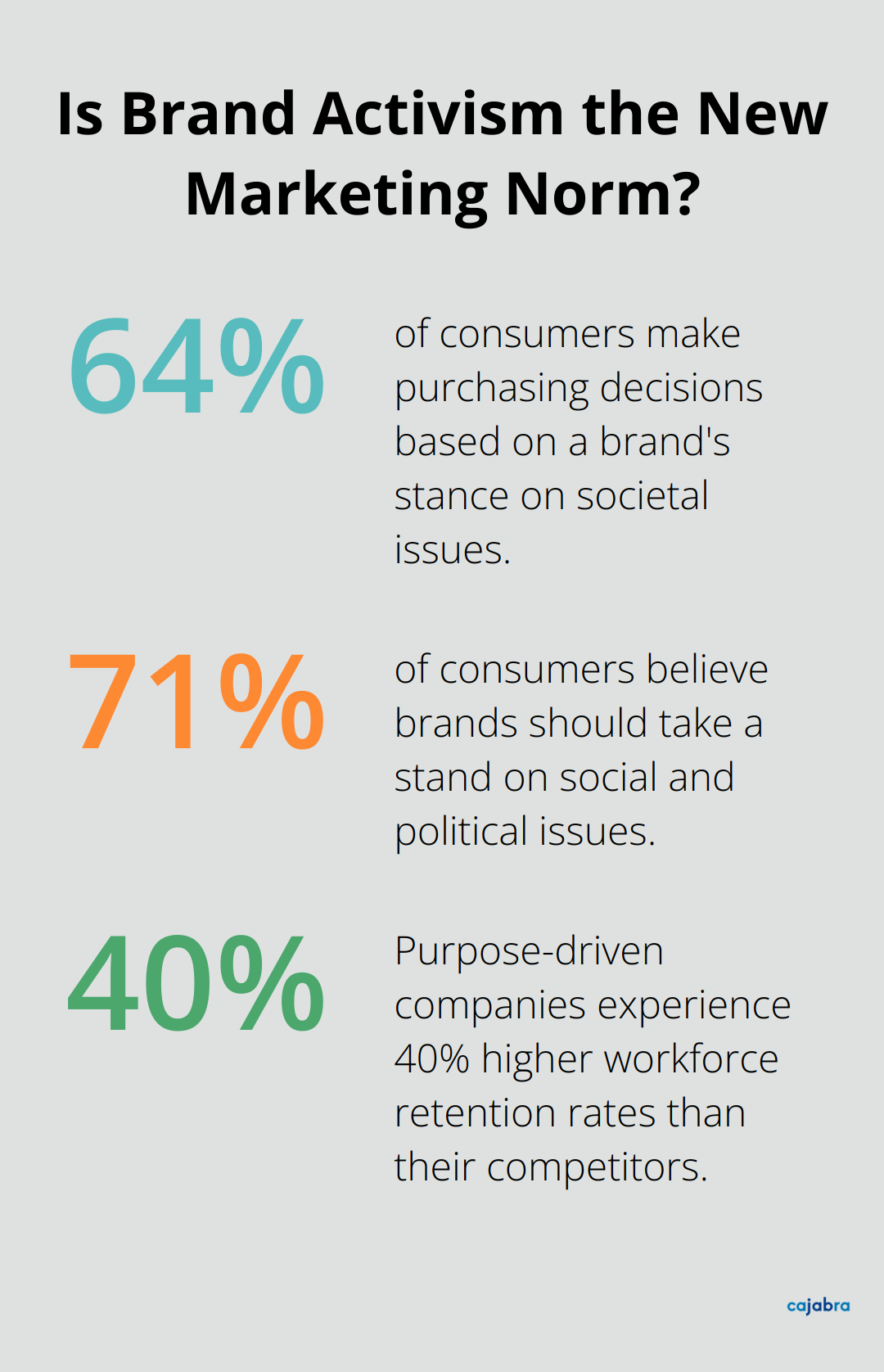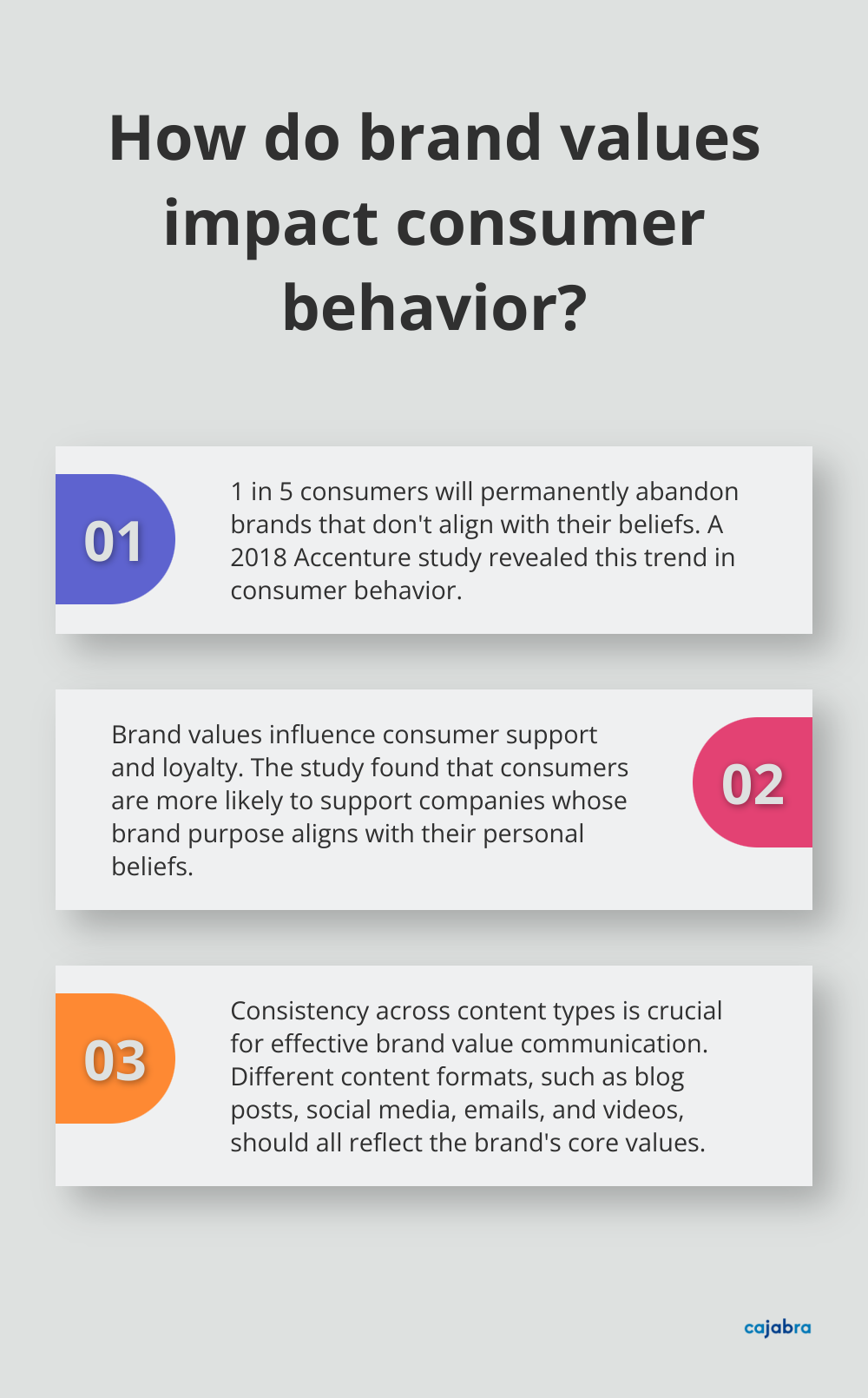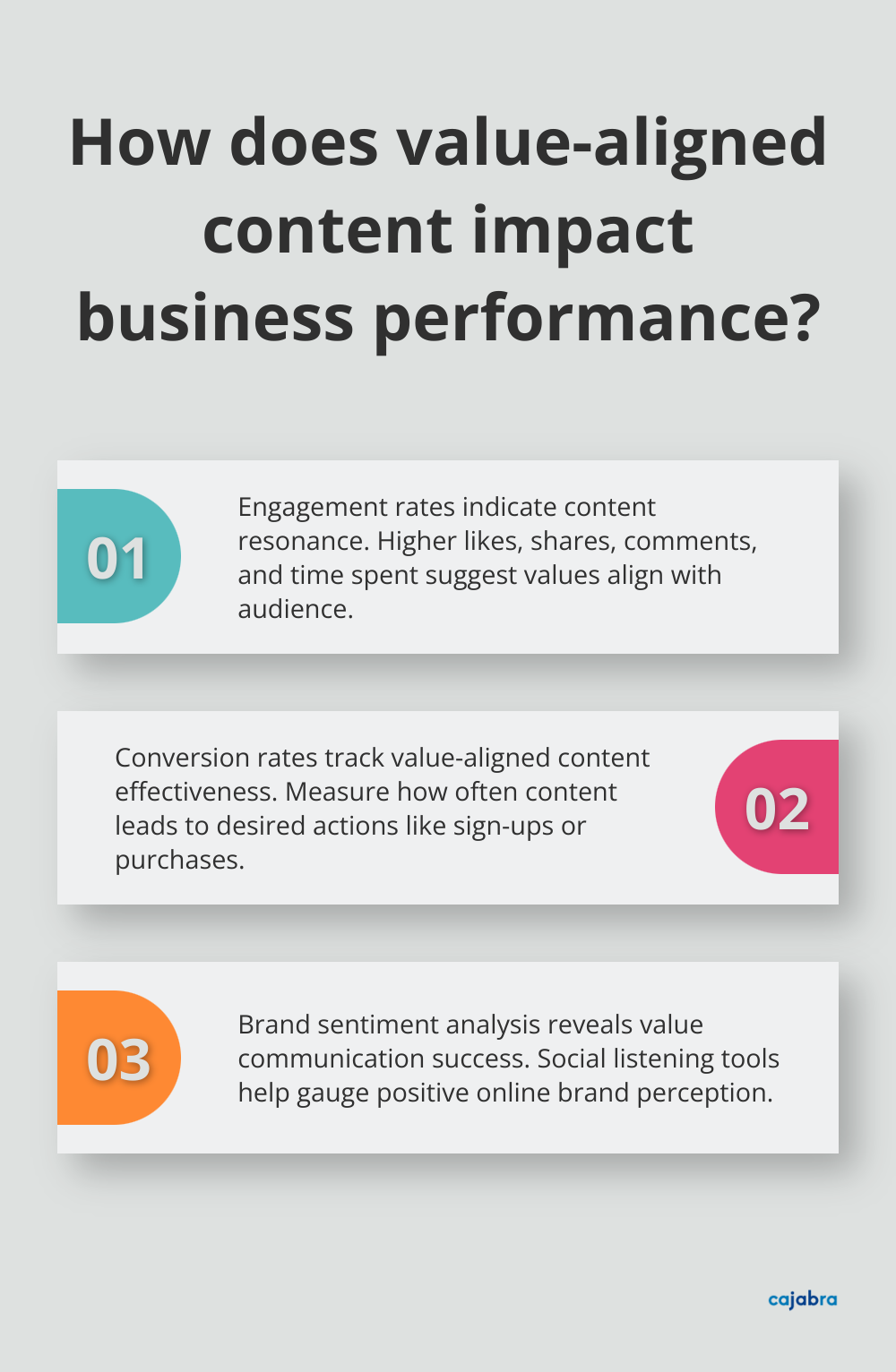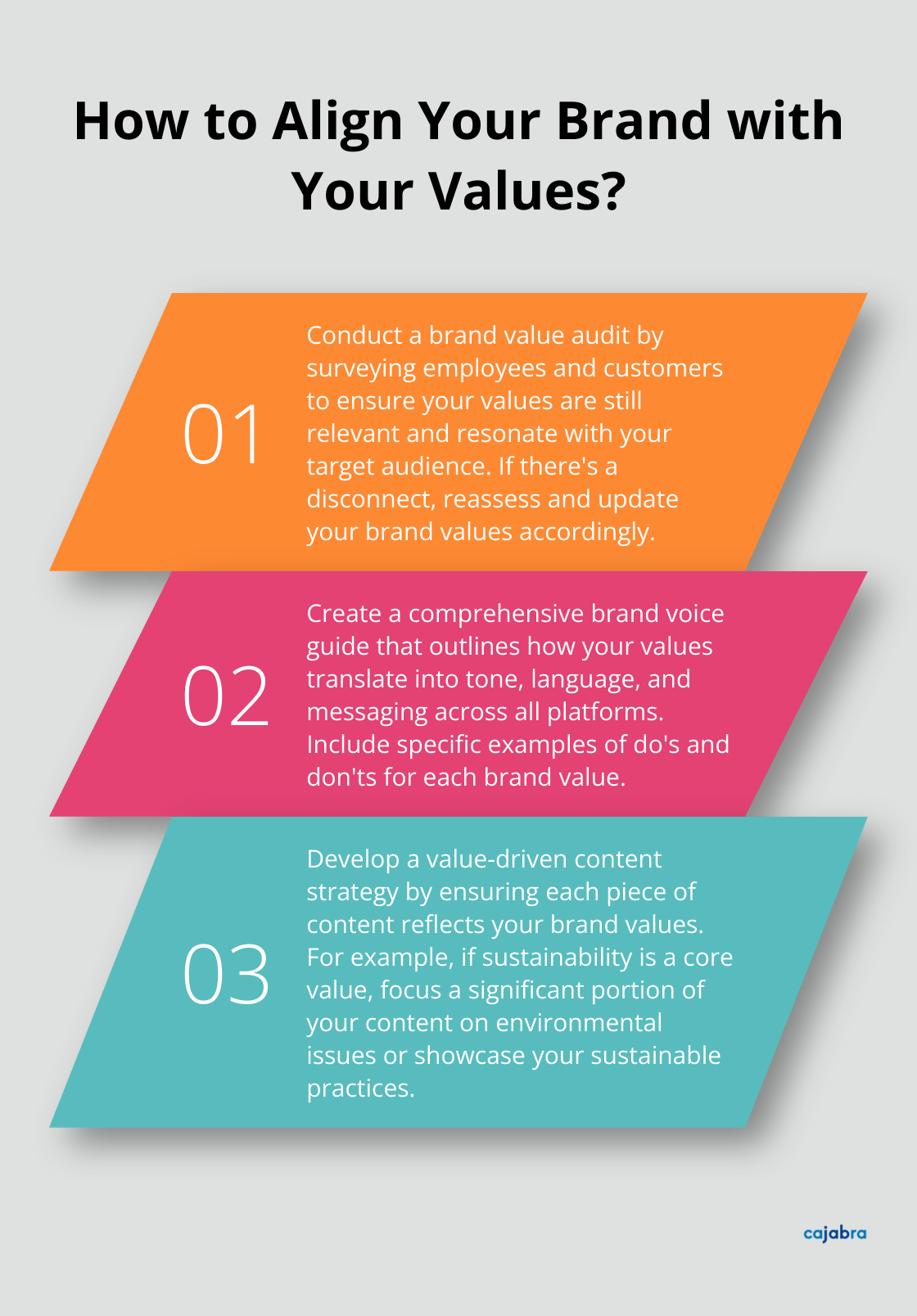
At Cajabra, LLC, we know that a strong content messaging strategy is the backbone of effective brand communication. Your brand values are more than just words on a page; they're the essence of your company's identity.
In this post, we'll explore how aligning your content with your core values can transform your marketing efforts and build lasting connections with your audience. We'll provide practical strategies to help you create messaging that resonates with your customers and reflects what your brand truly stands for.
Brand values form the core of a company's identity and guide its actions. These principles shape how a business operates and communicates with its audience. Companies that clearly define and live by their values create a strong foundation for all marketing efforts.
Value-driven marketing creates a powerful connection with consumers. A 2023 Edelman study revealed that 64% of consumers make purchasing decisions based on a brand's stance on societal issues. This statistic highlights the importance of authentic value communication in content.

Patagonia exemplifies this approach. Their commitment to environmental sustainability permeates their business model and messaging. This alignment has cultivated a loyal customer base, resulting in impressive growth (30% year-over-year in 2021, as reported by Forbes).
Brand values act as a lens through which consumers view a company. A 2022 Sprout Social survey found that 71% of consumers believe brands should take a stand on social and political issues. This doesn't necessitate commenting on every topic, but it underscores the importance of clear communication on issues that align with brand values.
Ben & Jerry's demonstrates this principle effectively. Their vocal support for social justice issues has become an integral part of their brand identity. While this approach may not appeal to everyone, it has strengthened their connection with their target audience and set them apart in a competitive market.
Value-aligned messaging doesn't just attract customers-it fosters long-term loyalty. A 2022 Deloitte report found that purpose-driven companies experience 40% higher workforce retention rates than their competitors. This principle extends to customer retention as well.
When customers feel a brand's values align with their own, they often become loyal advocates. This loyalty translates into tangible benefits: a Bain & Company study showed that a mere 5% increase in customer retention rates can boost profits by 25% to 95%.
Consistent communication of values through content invites customers to join a community that shares their beliefs and aspirations. This emotional connection transforms one-time buyers into lifelong customers and brand ambassadors.
As we move forward, we'll explore practical strategies for aligning your content with your brand values, ensuring that every piece of communication reinforces your company's core principles and resonates with your target audience.
Start with a thorough examination of your current brand values. Are they still relevant? Do they resonate with your target audience? A 2018 Accenture study found that consumers support companies whose brand purpose aligns with their beliefs, and one in five will walk away forever from brands that don't. This highlights the importance of up-to-date, meaningful brand values.

To conduct an effective audit, survey your employees and customers. Ask what values they associate with your brand. Compare these responses to your stated values. If there's a disconnect, it's time to reassess and potentially update your brand values.
After you've solidified your brand values, develop a brand voice guide. This document should outline how your values translate into tone, language, and messaging across all platforms.
Include specific examples of do's and don'ts. For instance, if one of your values is innovation, your guide might encourage the use of forward-thinking language and discourage outdated industry jargon.
HubSpot's brand pillars serve as an excellent example. They help define a brand's purpose, values, and identity for continued growth.
Your content strategy should directly reflect your brand values. If sustainability is a core value, ensure a significant portion of your content addresses environmental issues or showcases your sustainable practices.
Patagonia excels at this. Their Worn Wear program, which encourages repairing and recycling clothing, features prominently in their content strategy. This aligns perfectly with their value of environmental responsibility.
When you plan content, ask yourself: "How does this piece reflect our brand values?" If you can't answer this question, reconsider the content.
Different content types offer unique opportunities to showcase your brand values:
Blog posts: Use these for in-depth explorations of topics related to your values. For example, if transparency is a key value, consider a series detailing your supply chain or pricing structure.
Social media: Use platforms like Instagram or Twitter for quick, impactful statements about your values. Ben & Jerry's does this effectively, using their social channels to advocate for social justice causes.
Email campaigns: Personalize your emails to reflect how your values align with your customers' interests.
Video content: Use this powerful medium to show your values in action. Dove's Real Beauty campaign is a prime example, using video to challenge beauty standards and promote self-esteem.
Consistency is key. Your brand values should be evident whether someone reads a blog post, scrolls through your Instagram, or opens your newsletter.
The implementation of these strategies will create a cohesive brand message that resonates with your audience and sets you apart in the marketplace. Now, let's explore how to measure the impact of your value-aligned content in the next section.
To evaluate the effectiveness of your value-aligned content, focus on these key performance indicators (KPIs):
Engagement Rates: Monitor likes, shares, comments, and time spent on content. Higher engagement often indicates that your values resonate with your audience.
Conversion Rates: Track how often your value-aligned content leads to desired actions (e.g., newsletter sign-ups or product purchases).
Brand Sentiment: Use social listening tools to analyze how people talk about your brand online. Positive sentiment can indicate successful value communication.
Customer Loyalty Metrics: Measure repeat purchase rates and customer lifetime value. Customers who align with your values are more likely to stay loyal.
Employee Satisfaction: Don't overlook internal metrics. Employees who understand and believe in your brand values tend to be more engaged and productive.
To effectively measure these KPIs, leverage these tools:
Google Analytics: This free tool provides in-depth website traffic analysis, including engagement metrics and conversion tracking.
Social Media Analytics: Platforms like Sprout Social or Hootsuite offer comprehensive social media performance tracking.
Sentiment Analysis Tools: Brandwatch or Mention can help you gauge public perception of your brand.
Customer Relationship Management (CRM) Systems: Tools like Salesforce or HubSpot can track customer interactions and loyalty over time.
Employee Feedback Platforms: Use tools like Culture Amp or 15Five to measure how well your team aligns with and embodies your brand values.
Let's examine some brands that have successfully aligned their content with their values and reaped the benefits:
Patagonia's "Don't Buy This Jacket" Campaign: This counterintuitive campaign told customers not to buy their jacket. The message was intended to encourage people to consider the environmental impact of their purchases. It aligned perfectly with Patagonia's sustainability values.

Dove's Real Beauty Campaign: This campaign challenged beauty standards and promoted self-esteem. Dove saw a significant increase in engagement rates on social media and an increase in sales within the first year of the campaign.
REI's #OptOutside Initiative: REI decided to close its stores on Black Friday and encourage people to spend time outdoors instead. They saw a substantial increase in social media engagement and an uptick in membership applications.
These examples show that when brands truly commit to their values and reflect them in their content, the results can transform their business. In the accounting industry, firms that align their content with values like transparency, expertise, and client-centricity (core principles of Cajabra's JAB System™) have seen significant increases in engagement and client acquisition.
Measuring the impact of value-aligned content requires an ongoing process. Try to review your metrics regularly and adjust your strategy as needed. This approach will not only improve your marketing performance but also strengthen your overall brand identity.
A strong content messaging strategy aligned with brand values sets companies apart in today's competitive landscape. This approach fosters deep connections with audiences and builds trust through authentic communication. Companies that clearly express their values and support them with action will thrive as consumers become more selective about the brands they support.

We expect more brands to take stands on social and environmental issues, using their platforms to drive positive change. This trend will strengthen market positions while contributing to broader societal goals. A robust strategy rooted in brand values creates a meaningful dialogue with audiences, transcending mere marketing efforts.
At Cajabra, we understand the power of value-aligned messaging in the accounting industry. Our JAB System™ helps accounting firms develop strong brand identities and create content that resonates with ideal clients. This approach can transform firms from overlooked to overbooked, attracting clients who appreciate what they stand for.



